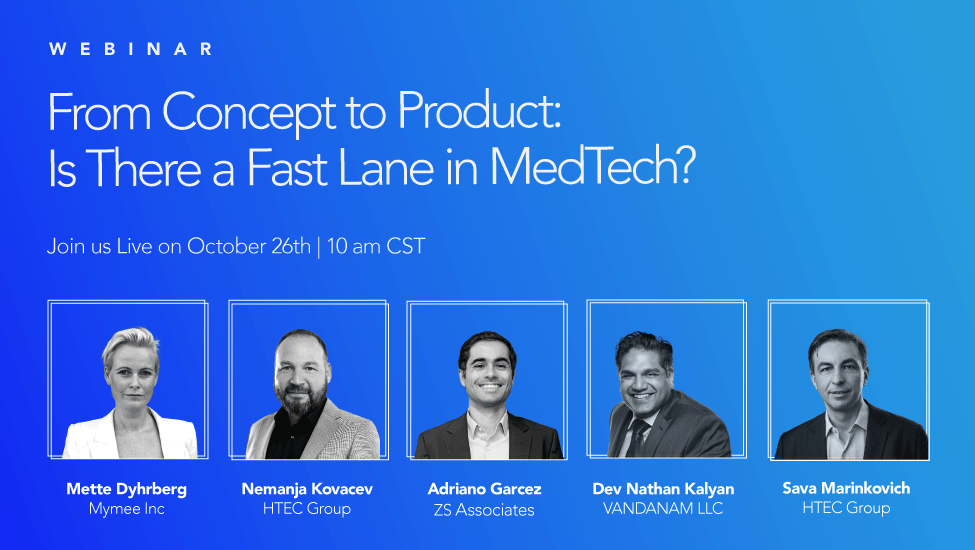We are excited to invite you to the upcoming webinar – From concept to product: Is there a fast lane in MedTech?
Who?
Host: Sava Marinkovich, Head of HealthTech, HTEC Group
Guest Speakers:
Mette Dyhrberg, Founder & CEO, Mymee Inc.
Nemanja Kovacev, Expert for MedTech at HTEC Group
Adriano Garcez, Director, Outcomes Research, ZS Associates
Dev Nathan Kalyan, Managing Principle, VANDANAM LLC
When?
Time: 26th of October | 10 – 11 am CST
Register HERE.
What?
With disruptions in the MedTech industry landscape, companies must find ways to adapt. The rapid changes in consumer access and empowerment are creating a new market and demanding faster transformation. The need for speed is no less obvious in building innovative medical devices that should treat and solve critical patients’ health issues.
Non-medical product development has accelerated over the past 20 years in other industries. Even in pharma, Covid vaccines have shown that the process can be rapidly accelerated while keeping patient safety.
It’s obvious that transformation trends will challenge the core business of MedTech disruptors. “The rise of federated learning, digital engagement, connected care devices and closer collaboration between the fragmented participants in the care value chain will continue to enable patients to choose home-based care and services, in hybrid models, rather than a hospital or clinic.
Med-Tech innovators will have to take a forensic interest in all real and potential user types – patients, clinicians, administrators, caregivers, family members, ancillary staff – in all settings, exploring why, where and how they will use the item, how they will interconnect with other services, and the ways in which data is stored, analyzed and shared. Those who manage to surface user pain points most effectively will predict how the solutions will need to evolve and be developed over time. Simultaneously, they will need to focus on reducing friction which will enable their delivery models to support the disaggregation of the value chain towards more micro-services-oriented architecture and scaled agile framework. This will not only take place in our data and technology platforms, but in the ways that we deliver care and benefits to our end-customers”, explains Dev Nathan Kalyan, Managing Principle, VANDANAM LLC
Indeed, the future of MedTech will be driven by transformational technologies such as AI, quantum computing, and augmented and virtual reality, which are poised to play a huge role.
“There are quite a few awesome things that we will be able to accomplish in the future by combining healthcare and tech: improve our care for patients, help doctors do their work and prevent burnout; improve and speed-up new medications discovery by using AI/ML tools and in silico trials. At one point, we will probably be able to treat and maybe stop aging – how cool is that?” — Nemanja Kovacev, Expert in MedTech at HTEC Group
However, approaches like rapid prototyping in medical technologies come with countless challenges and roadblocks. For instance, the rapid development of new medical products, especially those involving hardware, must progress in lockstep with regulatory constraints.
Adriano Garcez, Director, Outcomes Research, ZS Associates, explains: “The obvious challenge of rapid prototyping for medical devices is the need for regulatory compliance. Unlike other types of software, medical device software needs to meet a strict set of regulations and quality management systems to be approved for use. This means that legal manufacturers need to consider things like safety, efficacy, and quality control when designing their prototypes.
Another big challenge is the need for clinical data. To get their prototypes approved by regulators, manufacturers need to be able to show that their software works as intended. This often requires conducting clinical trials, which can be time-consuming and expensive.
Finally, there is the challenge of design iterations. Due to the complex nature of medical device software, it is often necessary to make multiple iterations of a prototype before it is ready for clinical trials. This can lengthen the overall development timeline and increase costs.”
Are there new ways to challenge some of the traditional assumptions, especially with technologies that help reduce risk and test value propositions more quickly?
Join this webinar, powered by HTEC Group, to hear thought leaders discuss the latest approaches and thinking around medical device innovation in a rapidly changing world.
Sava Marinkovich, HTEC Group’s Head of HealthTech, shares more about the key topic of the upcoming webinar: “On the topic of fast-tracking medical innovation, all the participants have a great mix of perspectives on digital-only, hardware, and wellness categories of medical innovation and health. The upcoming webinar is a great opportunity to discuss what’s really important for success when it comes to fast-tracking “medical devices” and how that translates to practical, core principles.”
Don’t miss the valuable insights
Here are some of the key points the panelists will cover in the webinar:
- Key differences between rapidly prototyping and testing new products in HealthTech versus MedTech
- The indication to innovation path – better to be a market maker or a fast follower?
- New product building in MedTech and HealthTech – why it is essential to market success
- Where do new product ideas in health falter, especially in early-stage ventures?
Registrations are open, so book your place on time! Follow this link for registration.
Curious to learn more? Connect with our participants:

